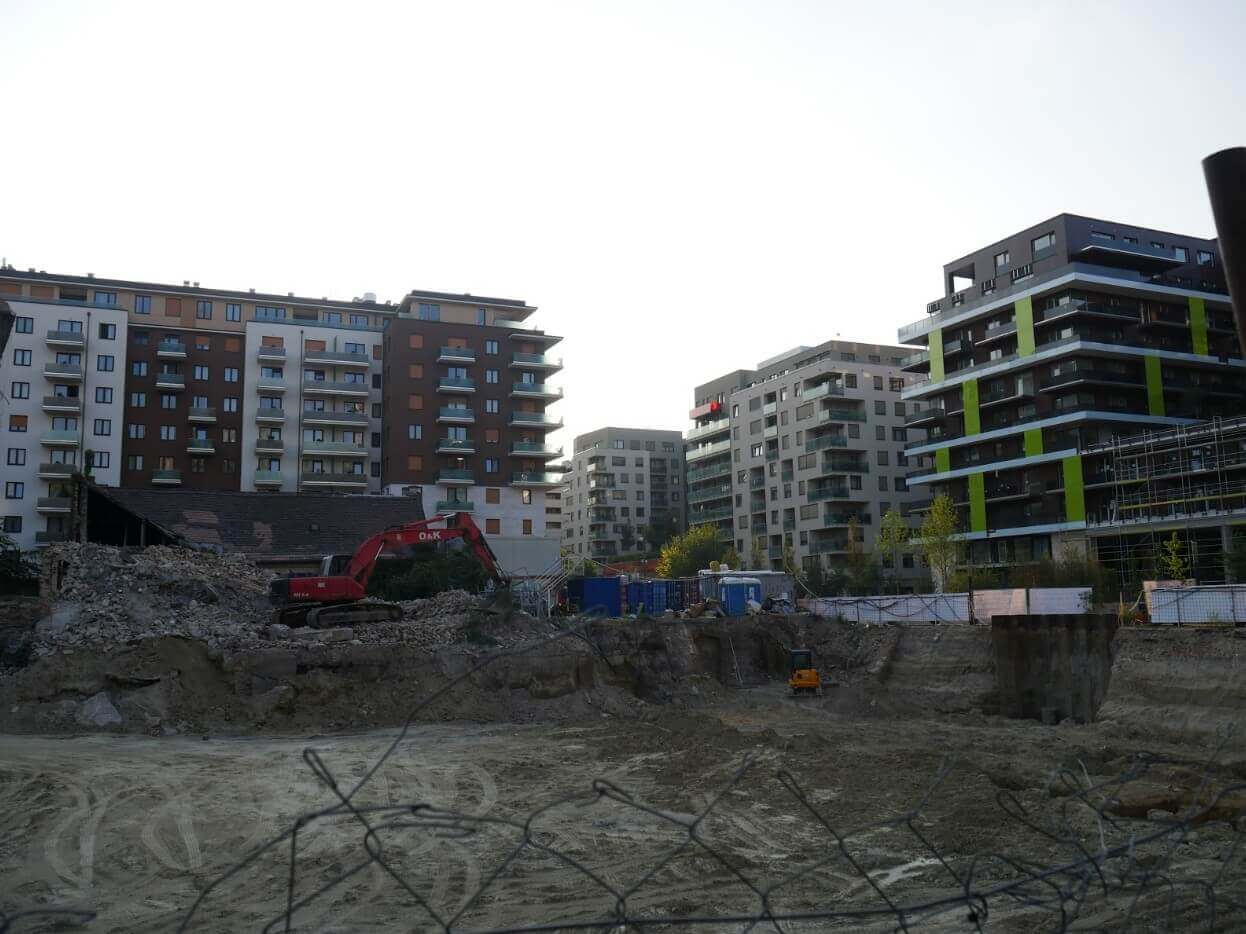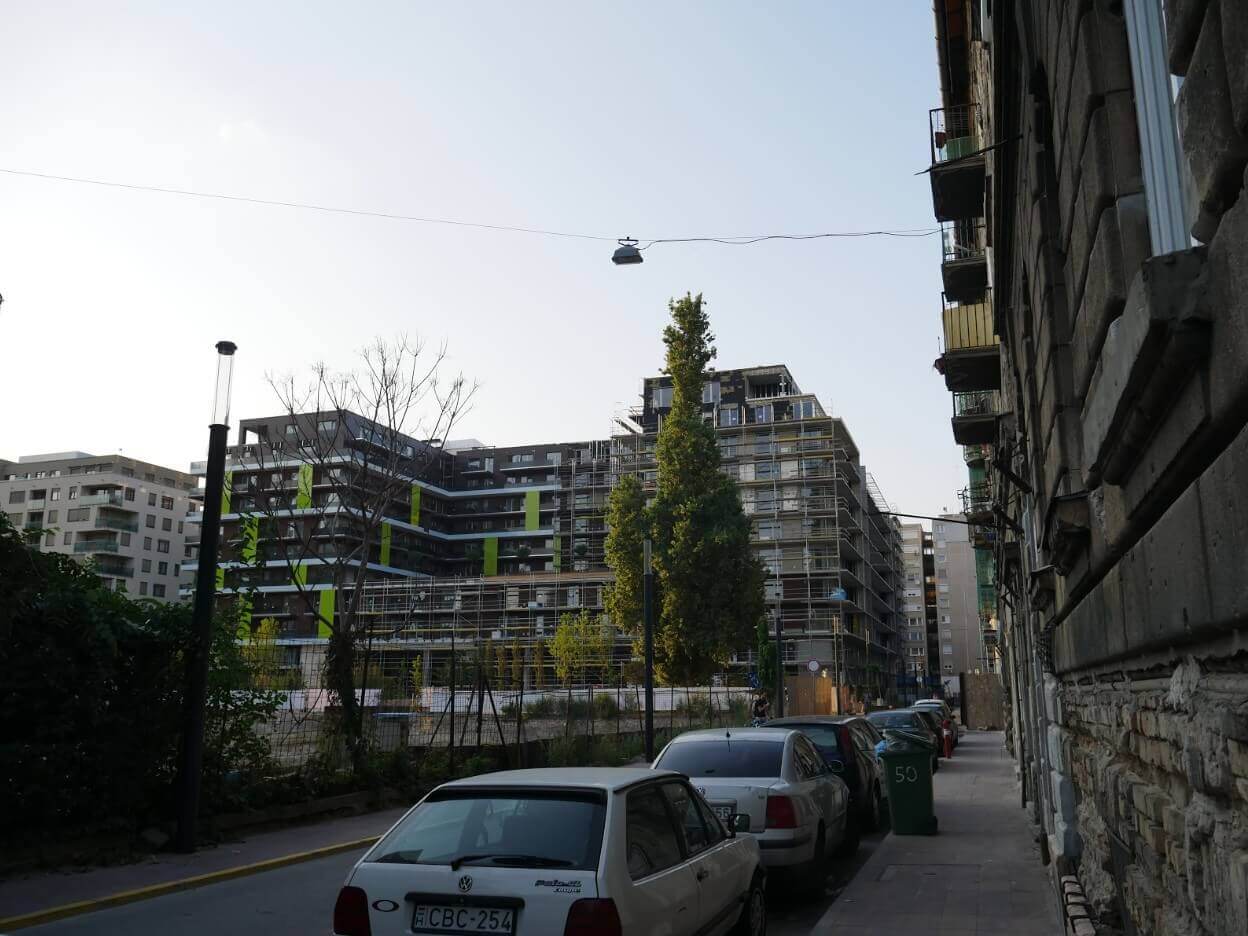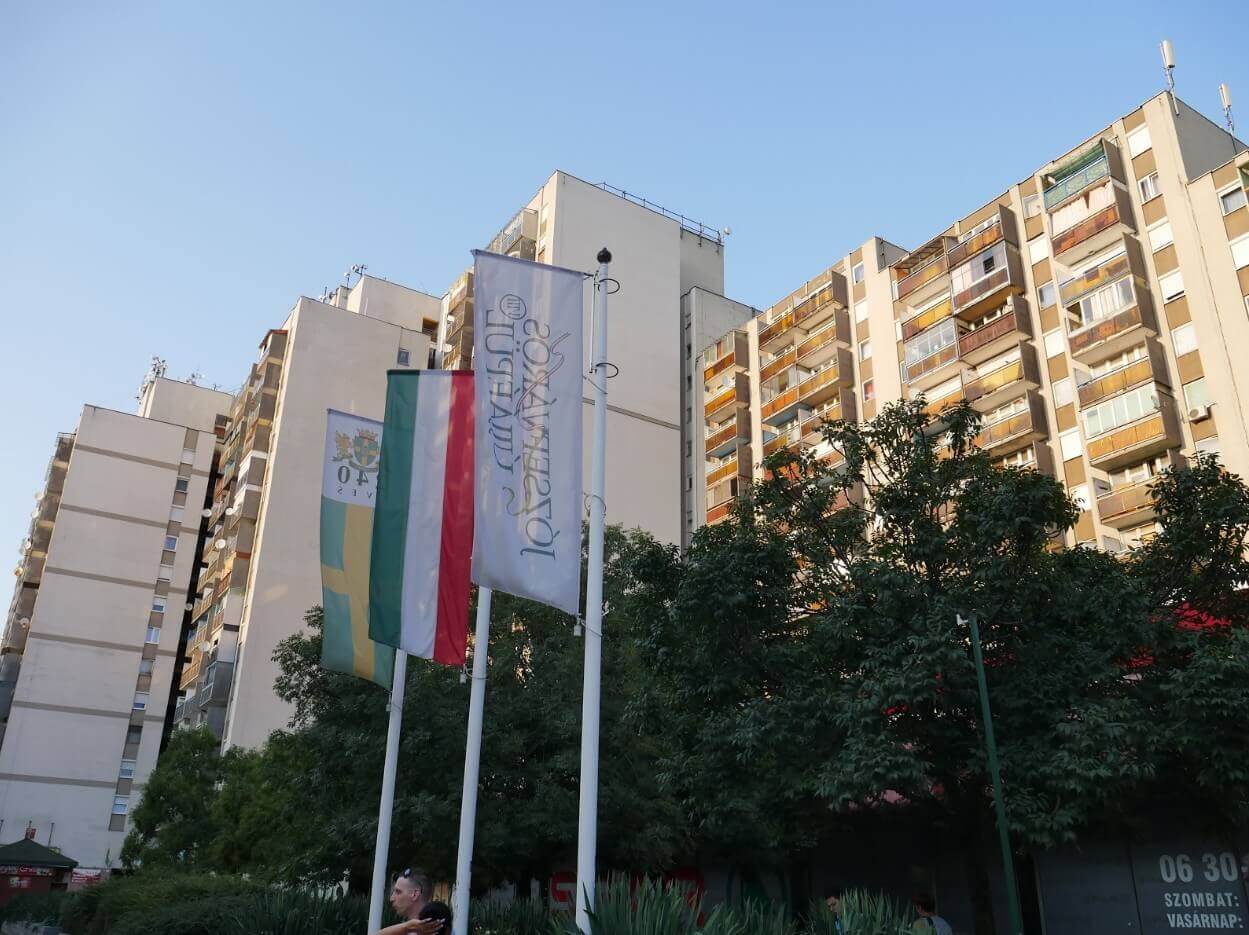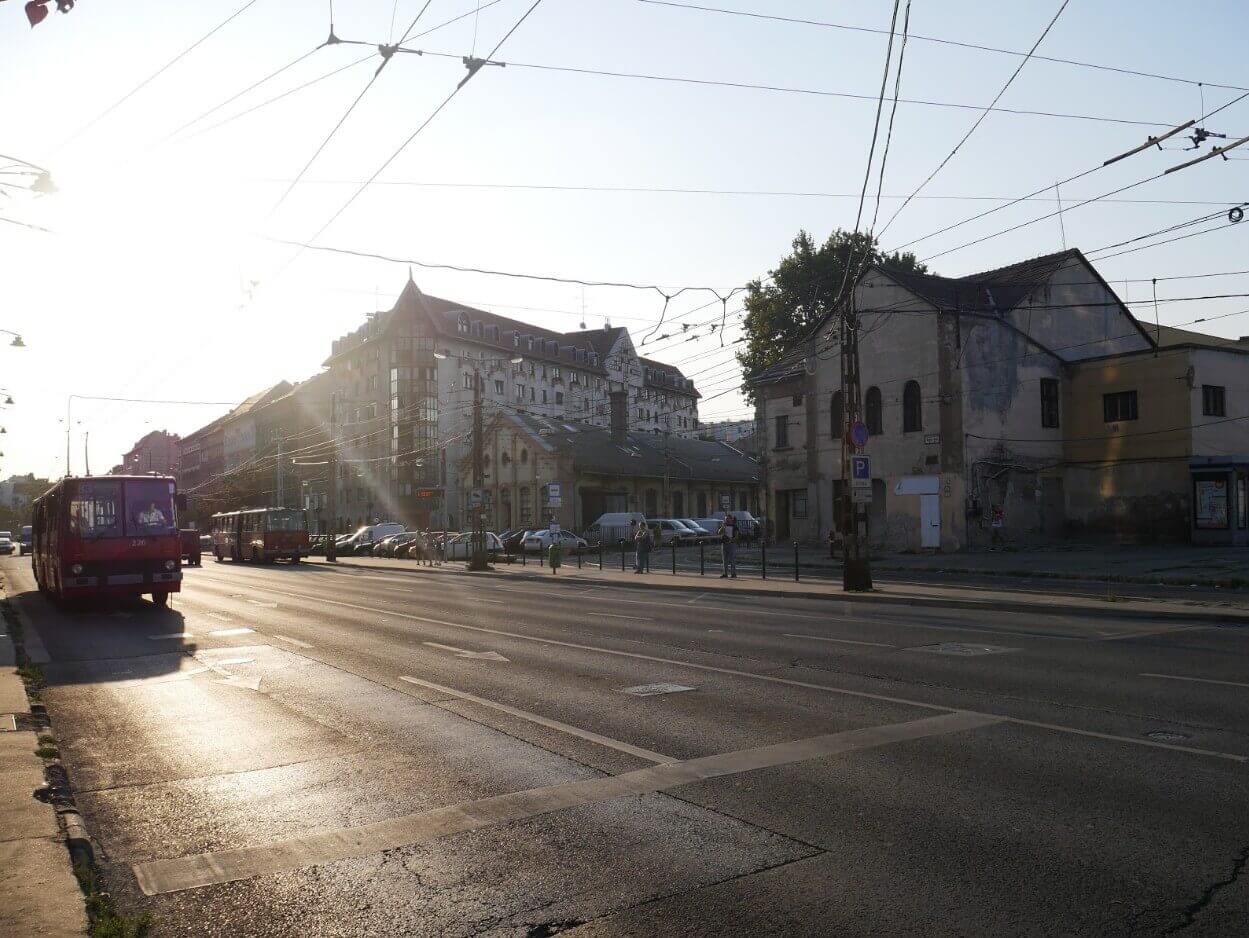In April 2018, Viktor Orban’s party, Fidesz, and its longtime ally, the Christian Democratic People’s Party (KDNP) won a resounding victory in Hungary’s parliamentary elections. The victory was no surprise, but its magnitude was: two-thirds of the seats in the Parliament were once again occupied by the increasingly far-right parties’ representatives. Three larger cities, and several constituencies of Budapest were the only places where Fidesz didn’t win majority.
So when an interim mayoral election was held in the Hungarian capital’s 8th district three months after the parliamentary elections, many were hopeful that it would bring a much needed victory for the opposition. Unfortunately, the election ended the same way the parliamentary elections had: with a Fidesz victory, and the opposition’s candidate winning only 36% of the votes.
Józsefváros – the “gangster district”
Budapest’s 8th district, Józsefváros, has recently risen to international fame. Kate McKinnon, the American actress known mostly from Saturday Night Live, performed a Hungarian rap duo’s song about Józsefváros on Jimmy Fallon’s late night talk show (in strikingly good Hungarian). As McKinnon states before launching into her performance, the district “was kind of rough in the ’90s”:
This is a dangerous place, a gangster district,
The weapons deal death here.
But we must make peace with the thought
That crime multiplies each day
An explosion rips the quiet of the night
Only the strong survive, the weak will die
Those who wander in all run away scared
This place is ruled by only bad guys
I was born here, we grew up here
What others say, I don’t care
Open your eyes and realize
This is just a district, part of Budapest.
(Direct translation)
Since the 1990s, Józsefváros’s reputation has slowly changed, along with its streets, thanks in to its mayor of the past 9 years, Máté Kocsis. Kocsis represents the best of what Orban’s party has to offer: he is smart, young, charismatic, and ruthless. During his years as a mayor, the 8th district has become safer, cleaner and less filled with potholes and rundown buildings, but it has also seen some of the most socially unjust policies of the Fidesz’s regime.

Kocsis was the first to implement a controversial law in his district that criminalized people living on the street: any person who was found to be living in “a public space” was fined, and if they couldn’t pay the fine, they were sentenced to a short prison term. The district’s radical “rehabilitation” meant that an entire neighborhood was torn down. Now, shiny new residential buildings stand in its place, clearly not intended for the people who had lived there before. An earlier renovation of the neighborhood –under the previous mayor – was set as an example, as it addressed the actual residents’ needs instead of forcing them out in favor of a more “desirable” population. However, with Kocsis coming into power, a wave of evictions started, and many of the now unoccupied and renovated council-owned apartments were given to the employees of the council. Evictions were a staple of Kocsis’s mayoral term, sometimes over a hundred in just a year.
Another victim of Kocsis’s rule was the KékPont, consultation center for drug users, which was shut down in 2014. The NGO that offered clean needles for drug users as well as consultations and support, were obviously an eyesore to the district, so the center had to go. The official reason was that they didn’t clean up after the drug users, and their needles littered the streets.
Kocsis also took a hard line with immigrants and refugees, never veering from the official party’s line – although he was one of the first politicians who actively took to hatemongering at the beginning of the refugee crisis in 2015, when thousands of refugees were stranded in Budapest for weeks. During that time, many of them camped out in a square in Józsefváros close to the train station where they hoped they’d be allowed to board a train to Germany. In a Facebook post, Kocsis said that the refugees ruined the newly renovated square, stating that “they light fires, litter, start fights, steal, attack people with knives…cause damage.”
8th of April – 8th of July
After winning in the interim mayoral election in July, Kocsis’s deputy mayor of the last six years, Botond Sára is poised to continue what his predecessor started, stating during the campaign that Józsefváros would not become “infested by drug addicts, migrants and homeless people” if he was elected. Throughout his campaign, Sára focused on safety and development, while emphasizing all of the positive changes the district went through during Kocsis’s mayoral, and his deputy mayoral term. His opponent’s, Peter Győri’s most memorable message was that he would halt all evictions planned by the council. Overall, he led a lukewarm campaign that didn’t attract too much media attention.

Győri, a local resident and economist, is not a member of any political party. However, his candidacy was supported by six opposition parties, which collaborated and decided to agree upon a single candidate, who they then supported publicly. These alliances were made by the so-called left-wing and liberal parties. The far-right opposition party, Jobbik, declined to align itself with anybody else. Jobbik didn’t support Győri either in the interim election, but their candidate withdrew his name from the election at the last moment (after leaving the party in May). The only other candidate in the mayoral election was from the Hungarian Workers’ Party’. In an interview, he announced that he would be happy if Fidesz’s candidate won the election.
Before the parliamentary elections, the opposition decided not to cooperate in the 8th district, thus fracturing the vote and leading to a Fidesz’s victory in Józsefváros in April. Back then, 20 173 people voted for the opposition (not counting Jobbik), but since the votes were divided between 4 different candidates, Fidesz’s candidate – Máté Kocsis (his departure from the mayoral seat in favor of a parliamentary seat was the reason an interim election needed to happen) – won with 18 818 votes. However, it was not ridiculous to think that with a single candidate, the opposition had a shot in the mayoral elections.
The turnout for the mayoral election was incredibly low, only 23% of those eligible to vote actually voted. 62.85% cast their vote for Botond Sára, Fidesz’s candidate, and 36.4% for Peter Győri, and less than 1% for the Workers’ Party’s candidate.
So why were the district’s residents so uninterested in the election (especially compared to the parliamentary elections, when the turnout was over 70%), and why did Sára win by such a large margin?
Out with the homeless, the drug users, the migrants!
While writing this report, we reached out to several organizations which were involved in Botond Sára’s campaign: the local branch of Fidesz, Fidesz’s youth organizations, Fidelitas’s Budapest branch and several local non-governmental organizations which publicly supported Sára’s candidacy. Unfortunately, none of these organizations responded to our emails (with the exception of a single NGO, who wrote that their president would be open to talking to us – after recovering from her recent surgery).
We had to therefore rely on tge social media and the local paper (which basically served as a propaganda outlet for Sára during the campaign), gathering comments from Botond Sára’s and the council’s Facebook page. We also talked to the members of the opposition’s candidate team, who provided us with firsthand accounts of campaigning amongst Fidesz-voters.
During the weeks leading up to the election, Sára had a very active Facebook presence: often accompanied by Kocsis. He made an appearance in every notable event the district had during these weeks. He inaugurated the openings of the medical facilities, announced plans for the construction of a brand new bathhouse and a pool, shook hands with members of the civil guard at an event in their honor, met with everyone who mattered. Prominent members of the local community posted public endorsements, detailing the many positive changes the Fidesz-led council had brought about in the past 9 years.
For Lajos, the owner of a pastry shop located in one of the most notorious streets in the district, endorsing Sára was an obvious choice:
„Our family pastry shop has been open for nearly 40 years on Népszínház Street, and I have seen how the district changed during this time. Its evolution in the past few years has been remarkable. The neighborhood has become nicer and public safety is much better now, which Botond Sára contributed to as a Deputy Mayor. These changes really help our guests to feel even more comfortable in our shop” says Lajos.
A local resident and a regular guest at Lajos’ establishment, Ilona, while agreeing with the owner’s assessment, still feels that there is work to be done. „Yes, Népszínház Street is getting better, but the situation there is unusually difficult, because there are two homeless shelters on each side of the street.” Ilona feels that in order for the street to evolve even more, it would be necessary to close one or both of these shelters, „instead of letting even more homeless people and immigrants come here!”
Ilona is certainly not alone in supporting the council’s efforts in pushing poverty out of Józsefváros. Under the Botond Sára’s Facebook posts before the election, the commenters regularly commend him and Kocsis for their work in this area. One of the comments underneath a Facebook post from Kocsis supporting Sára’s candidacy says:
„Máté Kocsis has achieved many wonderful things in our district, hopefully Botond will follow his lead. We don’t want any migrants, homeless people, drug addicts! They can go live in other districts, like Rózsadomb… [a very wealthy neighborhood on the other side of Budapest – editor’s note]”
Underneath a post commemorating the deputy mayor thanking the civil guard’s service, the commenters mostly mention the obvious evolution of public safety in the district. „Public safety has noticeably gotten better, which is mostly thanks to the civil guards. Keep it up, Józsefváros! Go Botond, go Józsefváros!”
Several people bring up specific streets, buildings or squares that have been renovated, although some of them have a few complaints about their neighborhood’s gentrification:
„It’s true, the Corvin block is becoming nicer constantly. I’ve lived here for 50 years, my husband for 73. We like living on Bókay Street, but ever since they’ve built an 8 story office building next to us, we get no sunshine, and they are constructing another 8 story residential building in front of us. So we don’t get any sunshine from either side. I wonder how Mr. Kocsis or Mr. Sára would like living in a dark apartment. I complained about this to Mr. Sára when he visited the street”– says Marika.

„We’d be happy if Sára was the mayor, my son who lives in the district will be voting for him” – vows a local resident’s mother in a comment under a post about the district’s development. „However, I do have two suggestions: the Blaha square has one of the most disgusting and foul-smelling underground pedestrian crossings in the city and it has been like that for years. OK, I know this is because of the homeless people, but there must be a way to clean it up because right now it’s absolutely dreadful. My other suggestion concerns a gorgeous little residential block next to Százados Street, which is full of completely-out-of-it drug addicts […] They should be cleaned out from there, because they are horrible and frightening and are starting to invade the neighboring streets as well. So good luck, but it would be great if these issues were solved.”
Another resident seems to have noticed that a lot of evictions take place in Józsefváros, and this obviously upset her:
„Dear Mr. Sára! I will vote for you, but I have one condition. I live under Bérkocsis Street 30, a rundown building that has been under deconstruction for the past 30 years. If they pull it down, will you put me out on the street or will I get another apartment? I pay for everything regularly, rent, gas, electricity. I am a 64 year old pensioner, I used to be a nurse. I don’t have any money, if I did, I wouldn’t be living here! They say that you simply evict people from rundown buildings. Please tell me this isn’t true, that you’re not so heartless!”
Botond Sára himself responded to this question, telling the worried resident she needn’t be afraid of eviction. „When a council-owned building is torn down, the council is obligated to offer a similar apartment in exchange, this is what happens anyway, but this is also regulated by the housing law. The tenant may also decline the exchange apartment, then the council offers monetary compensation. We have never thrown anybody out on the street and never will.”
(Of course, the woman suffering from a deadly brain tumor evicted in 2015, or the family with three small children evicted in 2016, or many-many others might disagree with the above.)
„No one has been able to do what these boys have achieved in the district for the past 50 years!” – proclaims a local resident under a picture of Kocsis and Sára. „Despite what anyone says, the facts speak for themselves! And let’s not forget how decent their campaign was, showing what they’ve accomplished and what they want to achieve instead of relying on smearing their opponent to get results,” Melinda.
On the topic of not smearing the opposition – Kocsis’s post supporting Sára’s candidacy had the following message: „We must not allow a pro-immigration SZDSZ member [the Social Democratic Party, which dissolved in 2006 – Péter Győri was a member – editor’s note] to lead Józsefváros, someone who would reopen the program for drug addicts and transform the district into a den of homeless people!”
But even without outright attacks on the opposition’s candidate, Fidesz had an enormous advantage when it came to influencing the voters’ views and opinions, which Sára, Kocsis and their team definitely exploited.
The advantages of power
Botond Sára built his campaign on three very simple buzzwords: migrants, homeless people, drug addicts. His message was basically „if you don’t elect me, the district will once again fall prey to these destructive elements.” As his supporters’ comments reflect, this approach resonated very well with them, especially paired with the many “Józsefváros reborn” posters that have marked all of the renovations in the district for several years now. The district’s leadership regularly neglects to point out that these projects are funded mostly by the EU money or thanks to tenders won by the council’s previous socialist leadership, way before Kocsis’s time.

However – and this would be hard to argue with – Fidesz does its job remarkably well in Józsefváros. That Botond Sára became Kocsis’s successor cannot simply be explained away by the fact that the Fidesz-KDNP alliance won the elections in April with a two-thirds majority. This victory was made possible thanks to years of local groundwork.
After Kocsis’s surprise victory in 2009 (thanks to its population’s large working class segment, the district was traditionally left-leaning), Fidesz’s local branch began a systematic process of building their network in Józsefváros. Instead of relying on big-city politics, they built a personal connection between the district’s politicians, council workers and local residents. They focused on placing the right, loyal people in influential positions. For instance, the council announced a tender to apply for the apartments’ caretaker position in the
council-owned residential buildings. The tender’s winners then became the caretakers of the building – and after receiving an apartment from the council, the caretakers remained loyal to their leadership, influencing their buildings in the right direction.
“This is what they expect from everyone: loyalty. We experienced this at the start of Peter Győri’s campaign during canvassing. By the time we got to a building to gather signatures, the caretaker had already gone around and collected everyone’s signature supporting Sára. And obviously, since they were already there, they also said a few bad words about Győri…” – Monika Bálint, a local resident and an activist in Győri’s campaign told us.
Monika also told us a rather telling story from the weeks leading up to the election: the interim deputy mayor, Péterné Sántha walked into a local pub and asked whether the place’s owner wanted to build a patio onto the sidewalk again this year, and whether they had already applied for the necessary permit. This is how it works: after paying attention to the lives of locals and their businesses for years, after already having assessed their needs, it’s easy to ask questions that suggest the future will be uncertain if the current leadership loses. Who would vote differently when their own future might hang in the balance?
Although it’s difficult to pinpoint this kind of “campaigning”, there were instances of voters being actively pressured during the campaign. A good example of this was when the parents of children attending local kindergartens got letters signed by Sára, detailing how the kindergartens in the district had developed thanks to the council, as well as a list of future plans. At the time of the incident, several parents reached out to us, saying that they found it strange that they had to sign a form stating they had received the letter. It’s important to note that according to the Hungarian law, party politics are prohibited from being displayed in any form in an educational institution. It would be difficult to see Sára’s letter as anything other than campaigning… Many of the parents felt that if they didn’t sign the form, their children’s lives might become more difficult at the institution. And which parent would be willing to risk their child’s wellbeing by declining to sign a piece of paper?
Since 2009, Fidesz’s local branch has systematically established relationships of dependence, which come in handy when Fidesz needs quick and precise work and mobilization. They don’t even have to apply the pressure directly, it’s enough to simply make the majority content and signal that everything will stay the same if the same leadership remains. The personal relationships build trust in the voter. The propaganda of success works.
However, one question remains: what about those who are not being helped by the leadership? Those who aren’t content, the “destructive elements”? People living in deep poverty in Józsefváros, Roma people, immigrants – Sára’s campaign mentioned them only in negative terms. It’s not an accident that the voter turnout was extremely low in neighborhoods where the majority is in a difficult financial situation, where people are generally less educated and occupy a lower social status.
Fidesz purposefully influenced the turnout as well: the council tried to distribute as little information as possible about the election. For instance, there were whole blocks that didn’t receive their voting notices (with information about the election’s date and the polling stations locations). Additionally, the local paper only ever wrote about Botond Sára in relation to the election.
Although the National Voting Office fined the paper during the parliamentary elections’ campaign because in one of its editions, the 20 pages-long newspaper published Máté Kocsis’s name 25 times and his picture 10 times, this didn’t seem to hinder the paper from doing the same thing during the mayoral election campaign. There was an edition that mentioned Sára’s name 11 times, and twice in an interview where the paper explicitly recommends the Fidesz candidate to the local residents. In comparison, Peter Győri’s name appeared only once in the same paper, and even then only in an interview with Máté Kocsis, who mentions the opposition’s candidate, saying that he would “transform the district into a den of homeless people” and would “attract drug addicts”.
A feudal state

Apart from the fact that Fidesz tackled the election with an excellent strategy (simple campaign messages that focused on people’s most basic fears, precise mobilization, and strong media advantage), the problem was that the opposition was unable to direct the flow of public opinion and highlight the problems inherent to the ruling party’s governance. Peter Győri tried to talk about the issues such as homelessness and poverty, but these messages were immediately corrupted by Fidesz’s accusations that he wants to populate the district with “bums” and drug users.
Józsefváros is a unique case: it is an evolving and developing district, but also one where there are still many people who live in terrible conditions. A place where the local authority, instead of looking for long-term, viable solutions simply tries to push these people out, or makes them and their issues invisible.
In Józsefváros, Fidesz perfected the method of placing the relationship between the citizens and the authority into a feudalistic framework: in a state of dependency, where the benevolent leader bestows his kindness upon the loyal people while pressuring those who aren’t. After all, it is not so surprising that the governing party claimed such a resounding success.
Józsefváros is only one example: but even though each smaller community has its own dynamic, examining just this one interim election demonstrates how much money, time and effort the government is willing to spend to stay in power. And it doesn’t bother them that they campaign using messages that have nothing to do with reality (on a country-wide level the campaign against George Soros is a good example of this, on a local level it’s the drug-addicts fearmongering in the 8th district), it’s enough to find the buzzwords that can successfully mobilize their voters. The ruling party had plenty of time to construct the infrastructure that help them achieve their political goals.
The question is: can the opposition succeed against this kind of infrastructure in the future, especially considering how few resources and supporters they have compared to the government? Can they find the right message that soothes people’s fears as successfully as Fidesz’s buzzwords? Because unless the opposition finds a way to combat the fears that have been deliberately instilled in the voters by Fidesz in the past eight years, things will not change.
![Political Critique [DISCONTINUED]](http://politicalcritique.org/wp-content/uploads/2015/09/Political-Critique-LOGO.png)
![Political Critique [DISCONTINUED]](http://politicalcritique.org/wp-content/uploads/2015/09/Political-Critique-LOGO-2.png)